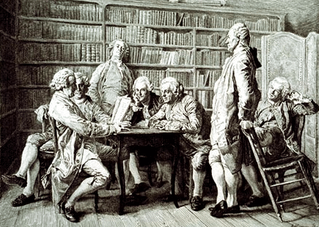 Enlightened thinking: La lecture chez Diderot
Enlightened thinking: La lecture chez Diderot Austen was a child of the Enlightenment, a flowering of thought whose importance to human progress cannot be understated. The long 18th century also saw the dawn of the Romantic period, the time of Byron and Beethoven and Sir Walter Scott.
And yet, in the midst of all the upheaval, change, cruelty, racism and poverty, Austen's genteel characters talk pleasantly and drink tea and go for walks in the shrubbery. Austen doesn’t write about battles or social unrest (with one notable exception). She seldom alludes to public events, and then only in passing. She focusses on people’s private conduct, their wishes, their mistakes, their follies. In her wry examination of human nature, fans and critics have found plenty to enjoy, re-read, think about, and write about.
So, is there anything more to her books? Is there yet another layer beyond the personal, the individual relations of her characters? Did she intend anything more?...
I am not speaking of taking Austen and creating something new--writing a variation of her novels set in modern times, or with a same sex-couple, or what have you. That's perfectly legitimate artistic expression. I myself have written Austenesque fiction and inserted historical events, gay characters, and a man who is on the autistic spectrum. I'm talking about wanting to see things in Austen that are not there, and not wanting to see the things that are there.
If you don’t view Western civilization as entirely a force for evil and if you don’t condemn everything that has happened on this globe since Columbus got lost on his way to China, you might not even know who or what I’m referring to. Those not familiar with this culture war might think I am criticizing a very small group of people whose nihilistic views are inconsequential. This is not the case, and I’ll have more to say about that later. In public discourse today, people are being bullied into making binary choices. When someone defends the advances of Western Civilization, they are attacked for being indifferent about human suffering, colonialism, and the slave trade. I'll be arguing for nuance.
The ideas I'll be presenting are mine, but I don't claim that they are original. Much has been written about Austen.

Secondly, Austen is a superb writer, and a genius at sketching characters, but she deliberately declined to grapple with politics and controversial public topics.
Austen doesn’t touch on politics, except in passing. “A strange business this in America, Dr. Grant!,” says Tom Bertram to the local clergyman. “What is your opinion? I always come to you to know what I am to think of public matters.” We never hear Dr. Grant's answer, and it doesn't matter. Austen uses the "strange business" as a funny bit of diversion, because Tom's afraid Dr. Grant overheard the rude thing he just said.
Neither does Austen take on social issues. Tithing, for example, is a social issue. Tithes—a portion of the agricultural produce of a parish—were given to the clergymen of that parish. Naturally, “[t]he collection of tithes was the cause of much ill-feeling between farmers and clergy,” as Eileen Sutherland writes in Persuasions. Austen’s father was a clergyman; she would have heard about tithes all her life. But Austen laughed at the suggestion that she include the issue of tithing in one of her novels. She lampooned it in her Plan of a Novel which includes a clergyman who inveighs against the system. “[T]he poor Father, quite worn down, finding his end approaching, throws himself on the Ground, and after 4 or 5 hours of tender advice and parental Admonition to his miserable Child, expires in a fine burst of Literary Enthusiasm, intermingled with Invectives against holders of Tithes."
I can’t say it better than Professor Robert Garnett:
| "[Austen's] novels dramatize not social ills, but individual failings: vanity, greed, pride, selfishness, arrogance, folly. For all her humor and wit, she was a rigorous moralist. Adult life demanded adult behavior: self-awareness, propriety, kindness, good sense." |
It was also an extraordinarily eventful time in history. Austen stands at the crossroads between the rowdy Georgian age and the strait-laced Victorians, at a time of important innovations in agriculture and manufacturing. During her life, Britain was convulsed with political and social unrest, not unlike our own time. England was at war for almost the entire course of her life. The British Navy sailed to the four corners of the earth, and slavers transported captive Africans to British colonies in the West Indies. Austen, famously, barely mentions these events.
I’ll quote Austen’s novels and letters to support my argument, looking especially for those occasions when she “breaks the fourth wall” and addresses her readers directly. Also, I’ll look at the plot and structure of the novels and her depiction of the characters to search for the ideas and beliefs (or as Austen would put it, the convictions and sentiments), most important to her. I'll compare her novels to those of her contemporaries. I'll re-visit and dispute the assertion that Austen was a secret radical. And I'll share some examples of Austen's genius.
| In A Different Kind of Woman, the final book of my Mansfield Trilogy, a writer tells little Betsey Price a story based on satires of the popular novels of Austen's day. Click here for more about my novels. |

 RSS Feed
RSS Feed